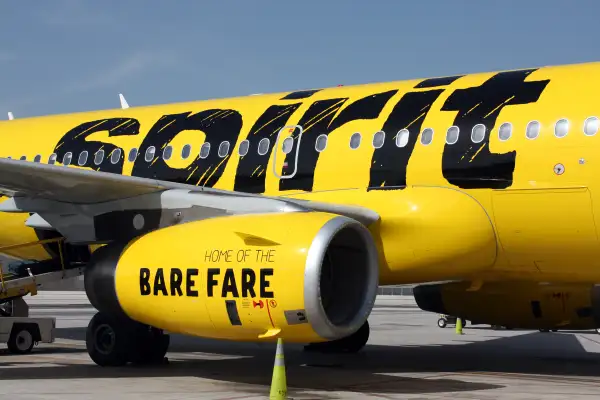America's Cheapest Airline Looks to Make Flights Even Cheaper

A sizable chunk of travelers hate Spirit Airlines and its cramped-seat, a la carte, fee-crazed business model. In a new Money poll, voters prefer the option of flying with snakes on a plane over flying on a Spirit plane. Yet investors sure are loving the company's third quarter results, which were made public on Wednesday. Spirit's adjusted net income for the quarter is up 28% year-over-year, while total operating revenue was up 14%. The results bumped the price of Spirit stock up more than 7% on Wednesday, and Morgan Stanley just named Spirit its top growth airline pick for investors.
What's particularly interesting is that Spirit's performance and its plans for expansion are likely to benefit non-investors as well. The airline's sales pitch to travelers is based almost exclusively on the low prices of its "Bare Fare" flights, and analysts see the stars aligning that will allow Spirit to cut base fares even lower. It's possible that this turn of events could even help out travelers who would never fly with Spirit Airlines—because other carriers may feel forced to scale back fares, or at least slow the pace of fare hikes, in order to compete with Spirit's cheaper flights.
Only three weeks ago, Spirit stock dipped significantly because of fears that higher company costs—including tax payments and the hiring and training of more pilots—would be headwinds getting in the way of higher profit margins. Yet a Motley Fool post pointed out this week:
Looking ahead to Q4 and 2015, these cost headwinds are likely to turn into tailwinds due to 1) lower jet fuel prices; 2) faster growth; and 3) a shift toward larger, more efficient aircraft.
Airlines typically spend about 30% of their revenue on fuel. So when gas prices drop like they have been lately, it's a huge deal for the airline industry. For the most part, airlines will simply pocket the fuel-cost savings rather than pass any of it along to travelers in the form of cheaper flight prices.
But there's reason to believe that Spirit Airlines is different. After all, the airline's main (only?) selling point is that the base price of flights is cheap, so it will lower fares to attract more customers whenever a price cut can be justified. In addition to lower fuel costs, Spirit is expanding rapidly (28 new routes added between August 2014 and April 2015), and has been getting more productivity out of planes and employees. All of which helps the company lower costs—and enables it to make its product more attractive to customers by lowering prices.
In a conference call with investors yesterday, Spirit CEO Ben Baldanza said that's essentially what the airline plans on doing. "The customers we seek to attract overwhelmingly ranked total price as the most important variable when choosing an airline," Baldanza said. As Spirit manages to keep the costs of fuel and other expenses low, "that's a great thing for our model, and that means even lower fares for customers and a good thing for investors."
And who knows? Spirit's expansion and low-fare strategy may very well compel the larger airlines to compete more on flight prices as well. Now that fuel prices are shrinking and airlines are enjoying record-high profits, it certainly wouldn't kill them to do so.
